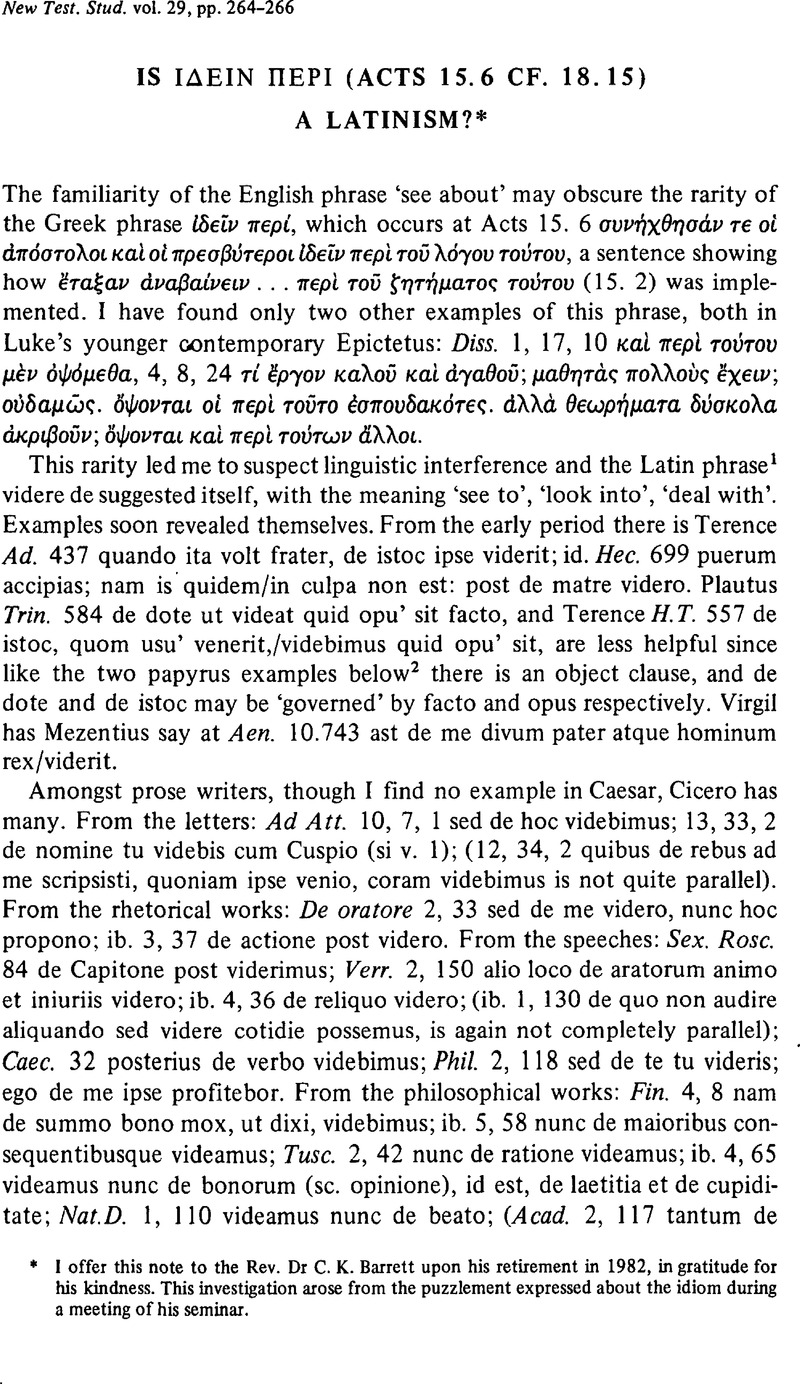Published online by Cambridge University Press: 05 February 2009

[1] Following the advice in Epictetus Diss. 1, 17, 16 ἴδ∈ πíσκ∈ψαι, π⋯ς τοῡτο λ⋯γ∈ται, καθ⋯π∈ρ ∈λ Ρωµαïστí! With his many years in Rome the influence of Latin on Epictetus is entirely feasible. Without giving any examples apart from the excessive use of diminutives Souilhé speaks of ‘l'introduction de latinismes’ as an instance of Epictetus's non-Attic language (Budé series, vol. I (1962), p. LXXI). The use of the future in Acts 18. 15 (see below) and the Epictetus-passages should be compared with the futures and the future perfects in the Latin examples also below. Bonaccorsi, G., Primi Saggi di Filologia Neotestamentaria vol. 1 (1933), p. 373Google Scholar, prefers cognoscere de; Blass, similarly F., Acta Apostolorum sive Lucae ad Theophilum liber alter (1895), p. 166.Google Scholar
[2] P. Zenon 59264, 3 ⋯µν⋯σθης µοι λδ∈íν τòν κ∈ραν⋯α π∈ρ`, τ⋯ν κ∈ραµíων, P. Par. 50 τò ⋯ν⋯τνιον, δ ∈λδ∈ν ν∈κθονβ⋯ς πρ∈ì τοον (= π∈ρ` τ⋯ν) διδυ⋯ν καì ⋯µ' αὐτο⋯. LXX Esther 10. 2 (Hanhart; 10. 3b Rahlfs; 10.(5) Swete) 2 Para. 9. 29 Mic. 1. 1 Jer. 3. 8 Josephus AJ 14.107 are similarly irrelevant. The Esther-passage is curiously similar to P. Par. 50.
[3] Mayser, E., Grammatik der Griechischen Papyri aus der Ptolemäerzeit 2/2 (1934), p. 447Google Scholar; Preisigke, F., Wörterbuch der Griechischen Papyrusurkunden 1 (1925), col. 570.Google Scholar
[4] I do not record ⋯πισκοπ∈ῑν π∈ρì though I know that ⋯πισκοπ∈ῑν provides some of the tenses for ⋯πισκ⋯πτ∈σθαι.
[5] This view of őψ∈σθ∈ αὺτοí represents a refinement of the opinion that it is modelled upon videritis alone (cf. Lake and Cadbury). Dr M. E. Thrall kindly reminds me of σὺ ⋯ψηat Matt. 27. 4 (cf. 27. 24); though these passages may well be abbreviated versions of òσᾱν/λδ∈ῖν π∈ρí, there is no obvious reason for the omission of the preposition, unlike Acts 18. 15 and Epictetus Diss. 4, 8, 24. Some commentators ad locc. compare Epictetus Diss. 2, 5, 29 and 4, 6, 11, but these, along with other passages which could have been quoted from Epictetus (Diss. 2, 6, 27; 3, 6, 4; 4, 6, 26; 4, 8, 13), are all followed by ∈λ.